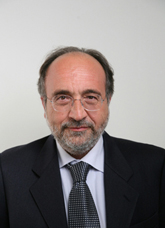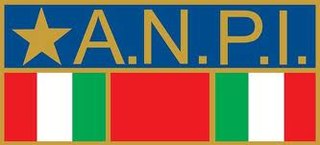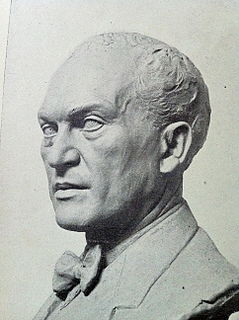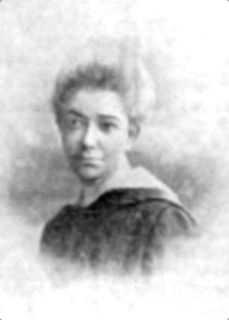Scouting and Guiding in Italy consists of several associations and federations, including more than 225,000 male Scouts and female Guides.

The Italian National Olympic Committee, founded in 1914 and a member of the International Olympic Committee (IOC), is responsible for the development and management of sports activity in Italy. Within Italy, CONI recognizes 45 national sports federations, 16 associate sports disciplines, 12 promotional sports organizations, 1 territorial sports organization, and 19 organizations for the betterment of sports. In total 95,000 sports clubs with 11,000,000 members are recognized. Its 2016 annual budget is 412,900,000 euros which is primarily funded by the Italian government.

The Gazzetta Ufficiale della Repubblica Italiana is the official journal of record of the Italian government. It is published by the Istituto Poligrafico e Zecca dello Stato in Rome.
Giuseppe "Bepi" Moro was an Italian footballer who played as a goalkeeper. An eccentric and athletic player, who was also an excellent shot-stopper, he is regarded as one of Italy's most spectacular keepers of all time; he was also known for his penalty–stopping abilities: with 16 saves in 270 appearances between 1947 and 1955, he has stopped the fifth–highest number of penalties in Serie A.

Giuseppe Giulietti is an Italian journalist, trade unionist and politician.

Associazione Nazionale Partigiani d'Italia is an association founded by participants of the Italian resistance against the Italian Fascist regime and the subsequent Nazi occupation during World War II. ANPI was founded in Rome in 1944 while the war continued in northern Italy. It was constituted as a charitable foundation on 5 April 1945. It persists due to the activity of its antifascist members.
The Dizionario Biografico degli Italiani is a biographical dictionary published by the Istituto dell'Enciclopedia Italiana, started in 1925 and not yet completed. It is planned to include about 40,000 biographies of distinguished Italians. The entries are signed by their authors and provide a rich bibliography.
"Spaccacuore" is a song written by Italian singer-songwriters Samuele Bersani and Lucio Dalla, together with Giuseppe D'Onghia. The song was recorded by Bersani for his 1995's second studio set Freak, and it was released as the album's second single in 1995. The song later became one of his best-known songs in Italy.

Brothers of Italy is a national conservative political party in Italy. Its leader is Giorgia Meloni, a member of the Chamber of Deputies and a former minister in Silvio Berlusconi's fourth cabinet.

Federico Leonardo Lucia, known by his stage name Fedez, is an Italian rapper, influencer, singer and songwriter. In 2011, he released the albums Penisola che non c'è and Il mio primo disco da venduto, released as free digital downloads. His first studio album, Sig. Brainwash – L'arte di accontentare, was released in 2013, and it debuted at number one on the Italian Albums Chart. The album, which spawned three singles, including the top 10 hit "Cigno nero" featuring Francesca Michielin, was later certified 3× Platinum by the Federation of the Italian Music Industry.

The national colours of Italy are green, white, and red, collectively known in Italian as il Tricolore. The three Italian national colours appeared for the first time in Genoa on 21 August 1789 on the cockade of Italy shortly after the outbreak of the French Revolution. Green, white and red are also national colours of Bulgaria, Hungary, Iran, Lebanon and Mexico.
The Italian National Agency for the protection and assistance of the Deaf (ENS) is an Italian non-governmental organization that acts as a peak body for national associations of Deaf people, with a focus on Deaf people who use sign language and their family and friends. ENS aims to promote the Human Rights of Deaf people italians, by working closely with the Italy. ENS is also a member of the World Federation of the Deaf (WFD) and European Union of the Deaf.

Romualdo Rossi was an Italian writer, editor and a journalist. Initially close to Benito Mussolini, he criticized Duce's stances, especially before the Italy's entrance into the second world war. He was co-founder, editor and collaborator of many papers close the Italian trade union.

The Sanremo Music Festival 2015 was the 65th annual Sanremo Music Festival, a television song contest held at the Teatro Ariston in Sanremo, Liguria, between 10 and 14 February 2015 and broadcast by Rai 1. The show was presented by two previous winners of the festival, singers Arisa and Emma, along with Spanish television presenter and model Rocío Muñoz Morales, and director of the show Carlo Conti.
Libero Corso Bovio was an Italian lawyer, journalist and professor. He was the descendant of a family of Neapolitan lawyers and jurists, and he was also a lecturer in law and a journalist. He is also known for being the nephew of Italian poet and musician Libero Bovio and the great-grandson of the famous Italian philosopher Giovanni Bovio.

Margherita Ancona was an Italian teacher and active in the women's suffrage movement in Milan. She was the secretary and later president of the radical bourgeois Comitato lombardo pro suffragio and member of the Italian branch of the International Woman Suffrage Alliance (IWSA). One of the leaders of the Italian women's suffrage campaigns, she was the only Italian woman to serve in her era on the board of the IWSA and was as a delegate to the Inter-Allied Women's Conference of 1919.

Giorgio Ficara is an Italian essayist and literary critic. He is Full Professor of Italian Literature at the University of Turin.

Alessandro Casati was an Italian academic, commentator and politician. He served as a senator between 1923 and 1924 and again between 1948 and 1953. He also held ministerial office, most recently as Minister of War for slightly more than twelve months during 1944/45, serving under "Presidente del Consiglio" Bonomi.

The Italian Rowing Federation is the national governing body for the Rowing sport in Italy. The FIS is currently based in Turin. The FIC was founded is 1888.
Vittorio Gorresio was an Italian journalist-commentator and essayist.












